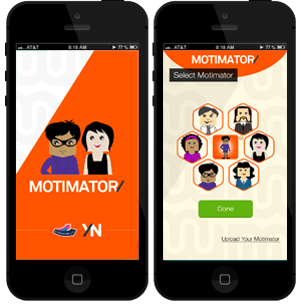Turning your hobby into a job
If you have a hobby you are passionate about but hate your day job, it might be time to reconsider your career options. Turning a love of retro clothing or playing Xbox into full time work isn't an easy option, but with determination it could be possible.

It's OK to bring your home life to work (sometimes).
When should I consider turning my hobby into a job?
If your current job is making you unhappy and you have a skill or interest you enjoy more, then it’s definitely worth considering going professional. Richard Simmons, 24, is now designing his own clothing label and running Art Is The Cure, an organisation promoting creativity as a tool to beat mental health problems. However, four years ago, he was feeling trapped in his day job as a shop assistant. “I was frustrated working behind a till all day as I’d always been very creative,” he explains. One day Richard decided to take action. He printed a batch of 20 T-shirts illustrated with his art and started selling them at gigs and on a website. “It was such a relief to think I was finally doing something that could change my life.”
Where do I begin?
Making your hobby into a job is a big step. There’s a big difference between relaxing by playing computer games and working in the gaming industry five days a week. “I would advise doing as much as you can to reduce the risk involved in leaving your day job,” says Sophie Beesley, head of the business programme at the Prince’s Trust. She recommends the following tips before leaving your current job:
- Get in contact with experts and ask them for honest advice about whether you have what it takes. You may love your hobby but you could be biased about your own ability. They can also suggest relevant courses or extra training you might need.
- Do work experience to see if you would enjoy becoming a professional. “It can quickly take the fun out of it if you do something five days a week and there is more pressure linked to it,” says Sophie.
- If your hobby has the potential to become a business approach the Prince’s Trust. They can give you a start up business loan, a mentor and put you on relevant courses to help you succeed.
What are the pros and cons of becoming professional?
The pros are fairly obvious – you get to do what you love on a daily basis. “I now get to be paid to be creative, which is what I always wanted,” says Richard. However there are also lots of sacrifices and it’s far from the easy option.
Richard was able to set up his own clothing label using a loan from the Prince’s Trust and he is now busy approaching retailers across the UK and the US with his T-shirt designs. He has even won an award for his website. However, putting so much energy into making his hobby succeed has had a big impact on other areas of his life. “My social life has been pretty non-existent over the last four years as all my time has to go into this. It can be really stressful at times and handling my finances can be tricky. But the pros definitely outweigh the cons.”
Can I afford to make it happen?
There’s lots of financial support out there. The Prince’s Trust, the Learning and Skills Council and individual industries all have grants and schemes. You could cut costs by getting a part time job, skipping nights out or moving home if you have supportive parents. If you really want to do it, you can.
So should I do it?
There is ultimately no right or wrong way to pursue a hobby as a career. You need a practical approach, to take advice from experts and to be honest with yourself. But above all you need enthusiasm. “Anyone with a genuine passion is going to want to do something about it and find a way to turn it into a job,” Richard says.
Next Steps
- Chat about this subject on our Discussion Boards.
By Dominique Brady
Updated on 29-Sep-2015
Picture of girl at work by Shutterstock.
No featured article














